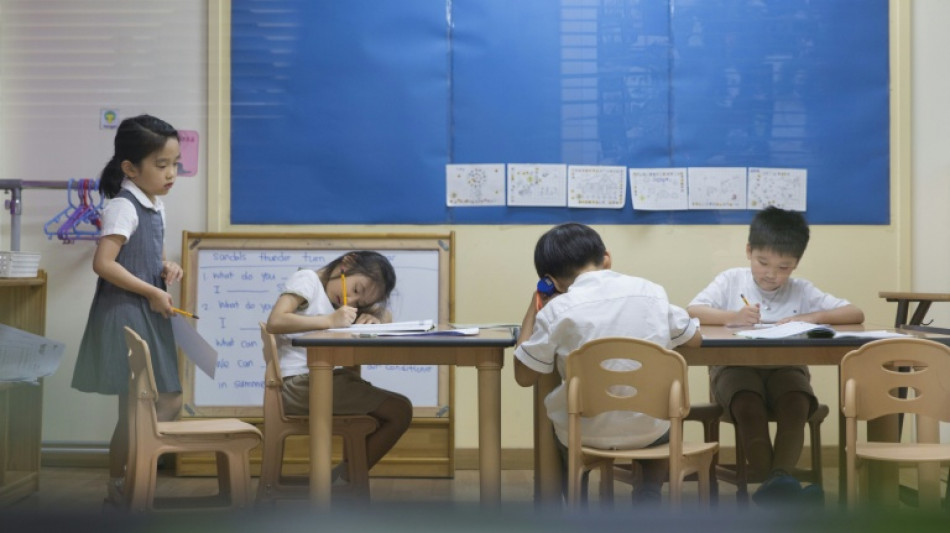
-
 Post-it maker 3M faces Belgian trial over 'forever' chemicals
Post-it maker 3M faces Belgian trial over 'forever' chemicals
-
UK comedian Russell Brand pleads not guilty to new rape, assault charges

-
 Duterte drew up 'death lists', boasted about murders: ICC prosecutor
Duterte drew up 'death lists', boasted about murders: ICC prosecutor
-
UK govt urged to release documents linked to ex-prince Andrew

-
 Rights group slams treatment of viral Japanese monkey
Rights group slams treatment of viral Japanese monkey
-
Inside the bunker where Zelensky led response to Russian invasion

-
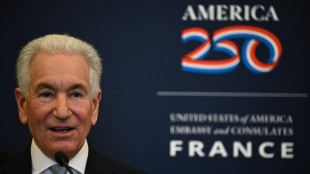 France demands explanation from US envoy over 'surprise' no-show
France demands explanation from US envoy over 'surprise' no-show
-
Putin failed to achieve goals in Ukraine, Zelensky says on war anniversary

-
 China tightens Japanese trade restrictions as spat worsens
China tightens Japanese trade restrictions as spat worsens
-
Ukraine war exhibition opens at Berlin Nazi bunker museum

-
 Jihadist threat puts eastern Senegal on edge
Jihadist threat puts eastern Senegal on edge
-
Kim Yo Jong: the powerful sister behind North Korea's supreme leader

-
 North Korea ruling party promotes Kim Jong Un's younger sister
North Korea ruling party promotes Kim Jong Un's younger sister
-
Mexico's Jalisco cautiously tries returning to normal after cartel violence
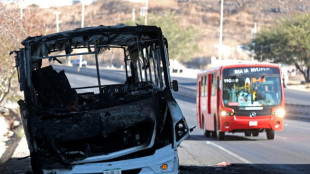
-
 Mexico's violence-hit Guadalajara to host World Cup games
Mexico's violence-hit Guadalajara to host World Cup games
-
Mourinho's Bernabeu homecoming upended by suspension, racism row

-
 China targets Japanese companies over military ties
China targets Japanese companies over military ties
-
Griezmann in talks to join MLS side Orlando City: source

-
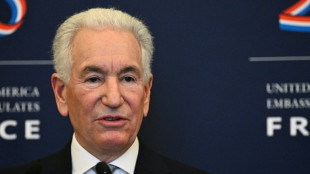 France to revoke US envoy's govt access after summons no-show
France to revoke US envoy's govt access after summons no-show
-
Spurs overpower Pistons in clash of NBA's form teams

-
 Inoue to fight Nakatani in Tokyo in May: reports
Inoue to fight Nakatani in Tokyo in May: reports
-
Canada PM to push trade, rebuild fractured ties in India trip

-
 Asian markets mixed as traders weigh AI and tariffs outlook
Asian markets mixed as traders weigh AI and tariffs outlook
-
Votes may 'melt like snow': Reform, Greens eye Labour UK bastion

-
 Venezuela says exiles welcome to return following mass amnesty
Venezuela says exiles welcome to return following mass amnesty
-
Australia buys parts for future AUKUS sub reactor

-
 Ukraine marks four years since Russian invasion
Ukraine marks four years since Russian invasion
-
Brazil court to try politicians over hit on black councilwoman

-
 Interim president says Venezuelans welcome to return after amnesty law
Interim president says Venezuelans welcome to return after amnesty law
-
Man kills police officer in Moscow train station blast

-
 Despite drop in 2025, Russian oil exports exceed pre-war volumes: report
Despite drop in 2025, Russian oil exports exceed pre-war volumes: report
-
Simulab Launches TraumaMan(R) System Ultrasound Module for Realistic Trauma Training

-
 Bytek Joins the Google Cloud Ready - BigQuery Program
Bytek Joins the Google Cloud Ready - BigQuery Program
-
Formation Metals Intersects 0.95 g/t Au over 61.1 Metres, including 1.68 g/t Au over 26.5 Metres at the Advanced N2 Gold Project; Bulk-Tonnage Gold Target Identified with 8 Kilometres of Strike to Explore

-
 Bolt Metals Announces Closing of Fully Subscribed Private Placement
Bolt Metals Announces Closing of Fully Subscribed Private Placement
-
InterContinental Hotels Group PLC Announces Transaction in Own Shares - February 24

-
 Nikon Expands Popular Monarch and Prostaff Binocular Lines
Nikon Expands Popular Monarch and Prostaff Binocular Lines
-
Australian PM seeks removal of UK's Andrew from line of succession

-
 Carrick hails 'ruthless' Man Utd match-winner Sesko
Carrick hails 'ruthless' Man Utd match-winner Sesko
-
N.Korea leader's sister promoted at party congress

-
 The key to taking down Mexico's most-wanted narco? His girlfriend
The key to taking down Mexico's most-wanted narco? His girlfriend
-
Winter storm blankets US northeast as travel bans imposed

-
 Super-sub Sesko fires Man Utd to win at Everton
Super-sub Sesko fires Man Utd to win at Everton
-
YouTube exec says goal was viewer value not addiction

-
 Panama wrests control of canal ports from Hong Kong group
Panama wrests control of canal ports from Hong Kong group
-
Trump denies top US officer warned of Iran strike risks

-
 Mayweather to fight Pacquiao in Las Vegas in September
Mayweather to fight Pacquiao in Las Vegas in September
-
US stocks tumble on tariff fog, worries over AI
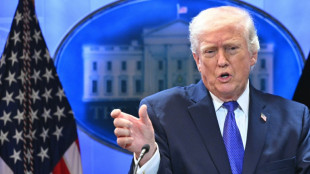
-
 US says China 'massively expanded' nuclear arsenal
US says China 'massively expanded' nuclear arsenal
-
US forces to complete withdrawal from Syria within a month


South Korea to ban mobile phones in school classrooms
South Korea has passed a bill banning the use of mobile phones in school classrooms nationwide, officials said Thursday, joining other countries in efforts to curb social media use among minors.
One of the world's most wired nations, South Korea has recently sought to tighten rules on electronic devices in schools, citing concerns over smartphone addiction among students.
The bill, which will take effect in March next year, bans smart devices including mobile phones in classrooms and was passed Wednesday, a National Assembly spokeswoman told AFP.
The move makes South Korea the latest country to restrict social media use among schoolchildren, following similar steps in countries including Australia and the Netherlands.
Seoul's Education Ministry said in a statement that the law bans the use of smartphones in classrooms except when needed as assistive tools for students with disabilities or special education needs, or for educational purposes.
The measure also establishes a legal basis to "restrict the possession and use of such devices to protect students' right to learn and support teachers' activities", it added.
Lawmakers including opposition People Power Party member Cho Jung-hun, who introduced the bill, said the issue had long been "contentious amid concerns over human rights violations".
But the country's National Human Rights Commission recently changed its stance, saying limits on phone use for educational purposes do not breach rights given their negative impact on students' learning and emotional well-being.
Against this backdrop, the law was needed to ease social conflict "by clearly defining rules on smart device use in schools", the lawmakers said in a document introducing the bill.
But it has drawn backlash from groups including the left-wing Jinbo Party, which said the law will "infringe on students' digital rights and right to education".
The measure "prevents adolescents from learning to make responsible decisions on their own and deprives them of opportunities to adapt to the digital environment", the party said in a statement.
F.Dubois--AMWN



